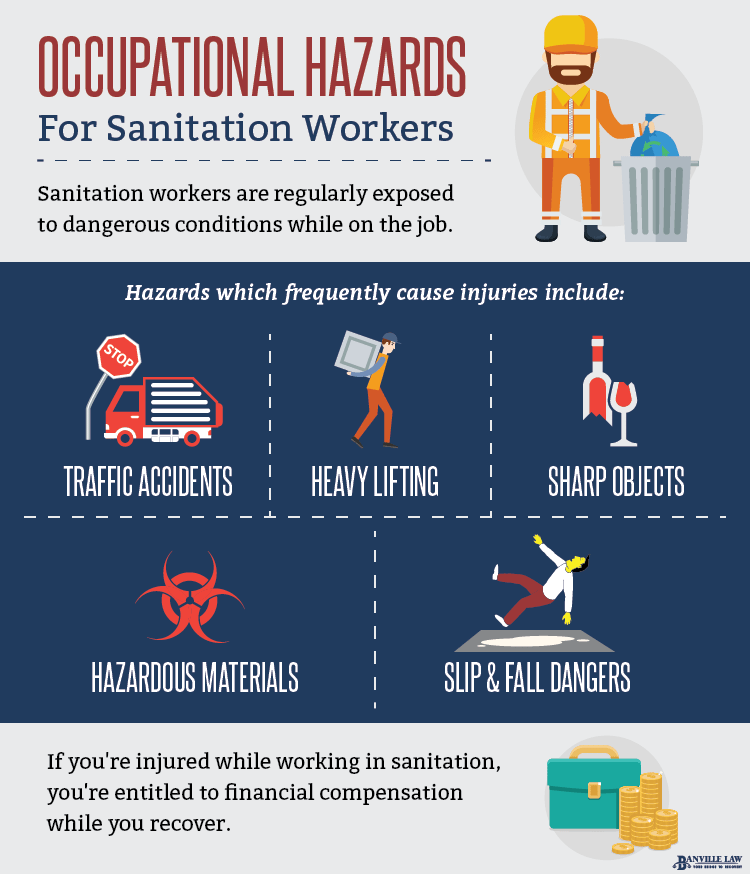Every day, New York City‘s brave sanitation employees work hard to keep our city’s streets and sidewalks clean. In the process, these workers are subjected to a wide variety of occupational hazards which can lead to serious injuries and illnesses. A typical shift involves navigating NYC’s congested and aggressive traffic, working with heavy machinery, heavy lifting, and exposure to potentially hazardous materials.
Out of all of New York City’s public workers, sanitation workers are at the highest risk of getting injured on the job. According to the Bureau of Labor Statistics, sanitation has the fifth-highest rate of fatal work injuries, making it an even more dangerous occupation than police work or firefighting.
When an injury does happen, it’s important for our sanitation workers to get the financial assistance they need while they’re out of work. Uniformed sanitation workers are one of the few groups who do not qualify for workers’ compensation in New York City – but they have their own system for handling serious work injuries. An injured sanitation worker must file a claim against the City of New York within 90 days of their accident. After that, the City will either accept or deny the claim.
Additionally, it’s common for injured sanitation workers to have grounds for a personal injury claim against a negligent party who caused their injury, such as a negligent motorist who caused an accident with their collection truck. In a successful lawsuit, an injured worker may recover compensation for medical expenses, past and future lost wages, and pain and suffering.
Find workmans comp lawyers near me to get started today.

Sanitation workers are surrounded by occupational hazards throughout each and every hour of their shifts. With such a wide variety of dangerous conditions, a serious injury could occur at any time. Some of the most common dangers include:

New York City drivers have a reputation for being aggressive and impatient. Many sanitation trucks make their routes during the morning rush, and it’s common for impatient drivers to attempt to overtake stopped trucks. This is just one of many examples of driving negligence which can lead to sanitation worker injuries. Drowsy drivers and distracted drivers are two other dangers for these workers. Sanitation employees who work on the back of the truck are at an especially high risk of serious injury if a traffic accident occurs.
Sanitation work is physically demanding, as trash collectors must regularly lift heavy bags of trash and other heavy objects which have been left at the curb. Proper lifting techniques can reduce the risk of a sudden injury, but it’s common for musculoskeletal disorders (such as chronic pain in the back, shoulders, and neck) to slowly accumulate over time. These conditions are eligible for the same benefits as accidental injuries, but it’s important to have medical evidence to prove that your condition is related to your job duties.
Garbage bags could contain a number of hazardous materials that can cause serious injuries to exposed workers. Examples include toxic chemicals, acids, needles, and pesticides. Exposure to dangerous substances can lead to infections, poisoning, chemical burns, respiratory illnesses, and other injuries. If a bag with hazardous waste is punctured by trash compactor blades, workers could be sprayed with the material.
It’s common for plastic garbage bags to contain sharp objects, such as broken glass or light bulbs. Trash collectors have no way of knowing when sharp objects are present, so it’s common for lacerations and puncture wounds to occur when lifting and carrying one of these bags.
Sanitation workers regularly brave harsh weather while working to keep our streets clean. While a blizzard may cause a delay in trash collection, these workers are often required to be out there in heavy rain, high winds, and snow and ice. Trash collectors are jumping on and off trucks and quickly moving through streets and sidewalks, which makes it easy for a slip or trip and fall accident to occur due to factors like icy sidewalks or potholes.
If someone else’s negligence caused you to be injured as a sanitation worker, you could potentially hold that party liable for damages in a personal injury lawsuit. Legally defined, negligence means acting in a way that endangers the safety of others. We all owe each other a responsibility to act in a reasonably safe way, and when a failure to meet this responsibility results in an injury, the victim deserves compensation for injury-related expenses and complications.
Examples of parties which could potentially be held liable for sanitation worker injuries include:
If your injury is so severe that you’re unable to work again, you may be eligible for Social Security Disability benefits. These benefits provide financial assistance for living expenses and medical bills. You must meet specific requirements in order to qualify, and receiving SSD benefits is not easy. However, an experienced work injury lawyer may help severely injured sanitation workers recover these benefits.
In order to recover the maximum compensation you’re entitled to, it’s often necessary to have the help of an experienced NYC sanitation work injury lawyer. Sanitation work injuries are often complex and may involve multiple forms of compensation. While some injuries may be unavoidable, many others are directly caused by the negligence of a third party. A lawyer can help investigate the circumstances behind your accident in order to determine your best options for compensation.
Additionally, a lawyer can help you with the process of filing a claim with the city by helping you fill out forms, gather evidence, and deal with the insurance companies. At Banville Law, we offer free consultations and work on a contingency fee basis – which means you pay us nothing unless we help you secure the compensation you need.
For similar reading, check out our next article: https://banvillelaw.com/workers-compensation/illnesses/asthma/